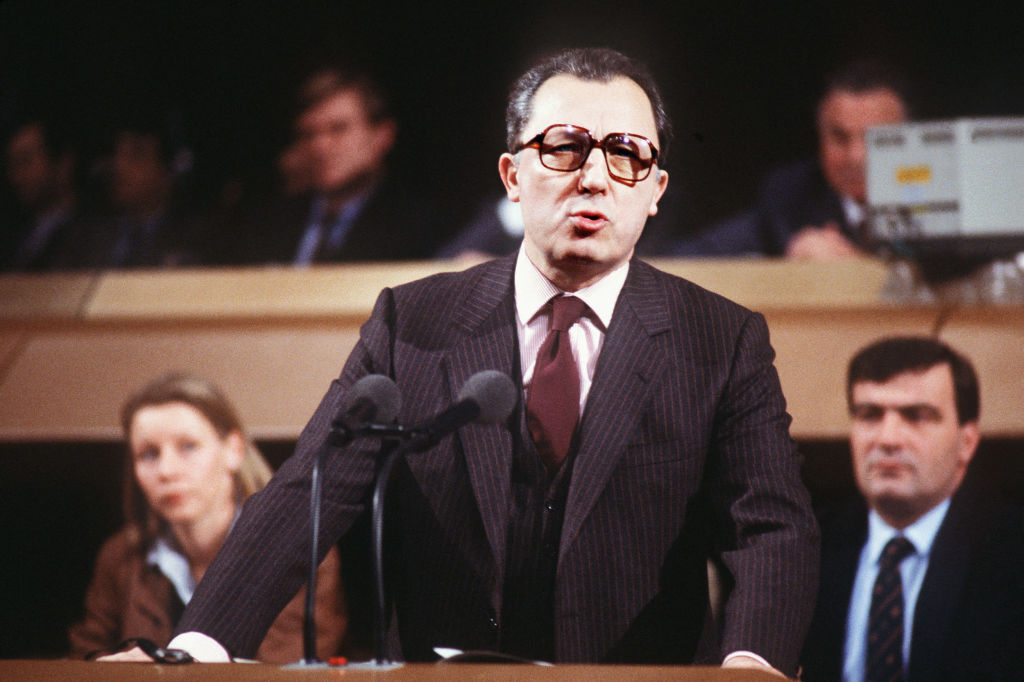‘Up yours, Delors!’
It was the perfect headline for the Sun: crude, defiant, unambiguous and directed at a Frenchman. The paper’s front page on 1 November 1990 called on ‘its patriotic family of readers to tell the filthy French to FROG OFF!’
The tabloid was asking its readers to turn towards France at noon the following day and shout the insult in response to the proposal by the President of the European Commission, Jacques Delors, to introduce European monetary union, setting economic convergence criteria with the objective of a single currency and a single central bank. The revulsion at the ECU, or European Currency Unit, was, however, a proxy for the broader movement in favour of closer European integration and supranational institutions, and beyond that, for every negative instinct towards the continent that Britons had ever entertained.
I grew up as British Euroscepticism was maturing and becoming a potent force in the Conservative party. There had always been a strand of opinion on the right which opposed membership of the European Economic Community, originally resting on lingering memories of the empire and loyalty to the Commonwealth. But after its applications to join the EEC in 1961 and 1967 had been rejected, Britain acceded to the community in 1973 under Edward Heath, and by then the Conservatives were largely in favour of the Common Market.
That began to change in the late 1980s. Margaret Thatcher, although she had campaigned for the United Kingdom to remain in the Common Market during the 1975 referendum, had never felt instinctive warmth towards Europe. At her first European Council meeting in Dublin in 1979, she arrived in a belligerent mood over Britain’s budget contribution, and was greeted with a frosty horror by President Valéry Giscard d’Estaing of France, a lofty, demi-aristocratic intellectual, and the ebullient, chain-smoking German chancellor, Helmut Schmidt.
‘We are simply asking to have our own money back,’ Thatcher had insisted in Dublin, and a substantial rebate was agreed at Fontainebleau in 1984, but it had shown other European leaders that the Iron Lady was not, at heart, one of them. The same summer, however, the council had agreed the nomination of Jacques Delors as the next president of the European Commission, to succeed the ineffectual Gaston Thorn in January 1985. It would change everything.
Delors was 59, a Socialist and Roman Catholic who been an MEP and then President François Mitterand’s economics and finance minister in 1981. At first he seemed Thatcher’s sort of politician: driven, focused, economically literate and accepting of market forces. Supported by the British commissioner she despatched to stiffen his resolve, Lord Cockfield, Delors was midwife to a white paper, Completing the Internal Market, which led to the adoption in 1986 of the Single European Act. But Delors wanted to go much further than simply the free movement of goods and services: his aim was a single currency, a European economy with a social purpose and relentless political integration.
Thatcher, increasingly dismayed by the direction of the EEC, spelled it out in the House of Commons in October 1990. Reporting on the recent European Council in Rome, she was stung by the way Neil Kinnock, the Labour leader, sought to portray her as out of step:
I do not want the Commission to increase its powers at the expense of the House, so of course we differ. The President of the Commission, Mr Delors, said at a press conference the other day that he wanted the European Parliament to be the democratic body of the Community, he wanted the Commission to be the Executive and he wanted the Council of Ministers to be the Senate. No. No. No.
It said it all.
Jacques Delors was the perfect figure to kindle the flames of British Euroscepticism. For all his embrace of market economics, he championed the community’s social dimension as a bulwark against unrestrained capitalism, a defensive wall for the workers left behind by deindustrialisation.
In 1988, he addressed the TUC Conference in Bournemouth. He talked of ‘solidarity’, and concluded that ‘social dialogue and collective bargaining are essential pillars of our democratic society and social progress’. Fundamentally he articulated beyond doubt where federalism was going. Control would accrete centrally to the European institutions in Brussels, and the future was a co-operative, corporatist, socially conscious Europe without borders. National sovereignty was old-fashioned.
Delors led the European Commission for 10 years, longer than anyone in its history. When he stepped down at the beginning of 1995, John Major’s government was on the rack, and the rack was Europe. Barely a month earlier, he had withdrawn the whip from eight of Eurosceptic Tory MPs, depriving himself of a Commons majority. By the summer, he called a leadership contest in which he was challenged by the Eurosceptic John Redwood, winning more narrowly than he had hoped.
After a catastrophic defeat at the 1997 general election, the Conservative party sought a new leader to replace Major. Europe was now the test of faith: Kenneth Clarke, by furlongs the most able and experienced candidate, was anathema because he was pro-European in general and enthusiastic about the single currency in particular. William Hague, 36, with less than two years in cabinet behind him, was willing to rule out joining the euro and showed enough hostility to the European Union to win his colleagues over. Perhaps he had Jacques Delors to thank.







Comments